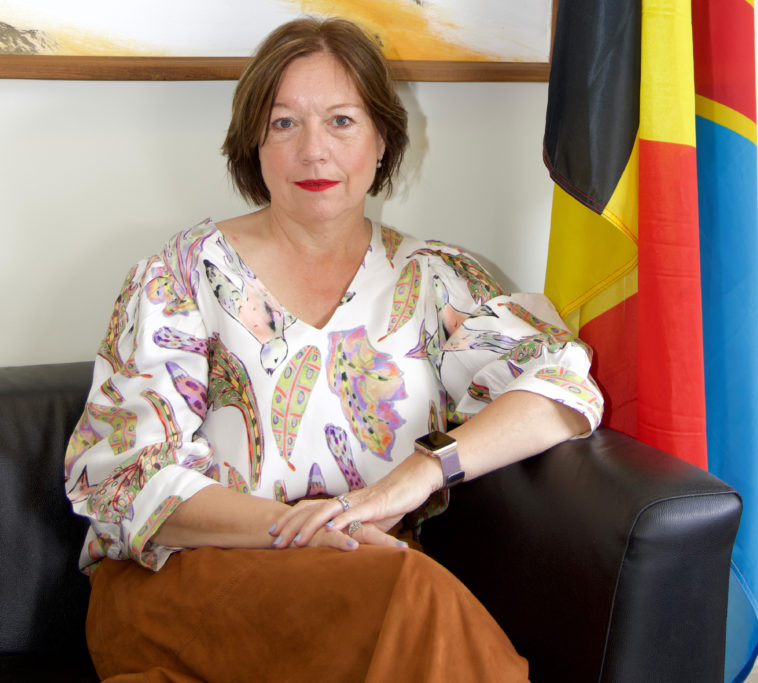The consulate General of Belgum in Lubumbashi, DRC is one of the few women to hold such a position in the Belgian diplomacy. She granted us an interview.
Madam Consul General, you have a long experience in diplomacy, how can you summarize it?
I have been working for the Belgian diplomacy for 35 years. My career path is rather particular.
I left Belgium right after my studies and travelled all over the world. Then I moved to Cairo where I started working in our embassy as a local agent. Of course, I could have stayed in Belgium, passed my exams, worked there. But I was impatient, I wanted to discover the world. Immediately after my studies, I left Belgium. I did it the other way around, I took the exam after I started working in the Embassy.
My first post as a Consul was in Kinshasa in 1998-1999. Our Embassy was very big. I had to manage the visa service. After that I went to Lebanon, Thailand, Berlin, Beijing, then I went back to Africa, to Nairobi, then I came back to Kinshasa in 2018.
In 2021 I did some interims in Lubumbashi to finally be appointed Consul General in January 2022. My position as Consul General in Lubumbashi, is obviously much broader than consular.
In addition to consular services, visa services, we do other things like the representation of Belgium and Europe because we are the only European consulate in Lubumbashi. It is also a political post because we are in an election year.
This post is therefore very important at the political level and obviously economic. The province of Haut-Katanga is a mining province, so the economy of the country is located here. The cooperation aspect is also important. Our development cooperation action will expand in 2023.
What do you think about the inclusion of women in positions of responsibility in the diplomatic service, for example?
I am obviously for the inclusion of women. I think that women must be independent in order to fulfill themselves. Women as well as men. Independence comes with financial independence. In this world, without financial independence, you can’t really be free.
I really encourage every young girl, young woman to have her own job, her own financial means. But there is more to life than money. You have to have passions. There are very few people who find passion by staying at home, without achieving anything.
I believe that it is rather in the public domain that one can flourish. In fact, I have a lot of respect and admiration for African women in general. I have worked in Cairo, in Kenya…
I see everywhere very well educated women who have an impressive career path. I know that the context is much more difficult than at home, that’s why I appreciate them so much. Obviously, many more women need to be included.
In all areas, banking, industry… But, having said that, there are a lot of women in all areas here. I think we’re going in the right direction, but we have to keep going.
When you are a consul, you have a heavy workload, how do you manage your private life?
The difficulty with diplomacy is the family, the spouses, the children. It is true that they did not choose this life, it is not always easy. Today, my children are already grown up, they have their own life. I have much more freedom. But before, I had a family to manage.
My partner also had his own career. That’s probably why I stayed in the middle management for a long time because I had some time to manage my family. And choose the positions better. Being an ambassador’s spouse is not easy for either women or men. For men, it is certainly even more difficult.
In Lubumbashi, social life is rather easy, we have leisure activities, sports. In the next five or ten years, how do you see the Congolese woman?
I see her continuing in the right direction. I emphasize that Belgium, in its political cooperation, puts a focus on this. Our programs intend to strengthen the capacities of women in politics.
It is important to know that in the Belgian diplomacy, only 13% of women are currently heads of post. Our ministry has a mission to increase this number. Already for the coming summer, we will increase this number to 17%.
And soon, we will have a woman ambassador in the DRC. So we have to work with quotas, training programs, encouraging women, especially if they have the capacity to lead.
Interview by Iragi ELISHA for M&B.
Lubumbashi. January 31, 2022.

